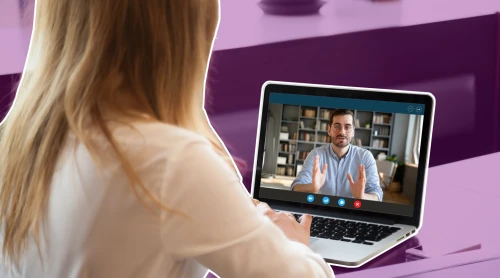COVID-19: When Employees Are Afraid to Return to Work
Ways you can alleviate fears and work with employees who may need accommodations
July 22nd, 2020
Although many states have lifted shelter-in-place orders and businesses are allowed to re-open their doors to the public, COVID-19 is still in our midst and many employees aren't convinced that it's safe to return to work. Having an employee object to recall from furlough or work from home is a common employer concern. If this happens to you, it's important to inquire about the nature of the objection and respond accordingly.
As an HR pro, employees will be looking to you for understanding and guidance during this time. We've put together actionable steps about what to do if employees express fear about returning to the workplace including how to alleviate these fears, and how to work with employees that need accommodations.
Fear of Infecting Others
If an employee is fearful in general, or lives with someone who is particularly vulnerable and they're concerned about infecting them, talk to the employee about all of the precautions that the company is taking to keep everyone safe. Creating and sharing a detailed return-to-work plan should help alleviate this fear for some employees.
Consider extending your work from home policy for positions that are eligible, therefore minimizing the amount of employees in the physical workspace.
Fear of Getting Infected
If an employee informs you that they are fearful because they themselves have a health condition or are vulnerable for another reason, you should allow them to work from home. If this is not an option due to the nature of their job, explore whether the employee would be eligible for emergency paid sick leave (EPSL) under the Families First Coronavirus Response Act (FFCRA).
If they are not eligible, or have exhausted their FFCRA options already, the employee may be able to request a medical leave of absence under your company's medical leave policy, or state law that might apply to these circumstances. Most likely to apply is the American's Disability Act (ADA), which applies to employers with 15 or more employees. Most conditions that make someone especially vulnerable to COVID-19 will be considered disabilities under these circumstances, so you'll need to provide reasonable accommodations such as working from home or a leave of absence. This guide from the U.S. Equal Employment Opportunity Commission (EEOC) can help you figure out what regulations you may need to comply with under the ADA.
Communicating with Employees
Remember to document your employee recall in writing, and document employees' responses to the recall. That way you have a record for yourself and any third parties that may be involved. If you have a modern HRIS like GoCo, you should be able to create a return to work policy that automatically inserts the employee's information, and allows them to electronically sign and acknowledge receipt of the policy.
Your system should also be able to help you stay in compliance with new regulations such as the FFCRA. GoCo’s COVID-19 Paid Leave Tracking feature automatically calculates the correct amount of leave time for both Emergency Paid Sick Leave and EFMLA.
If you have questions about how to use GoCo to communicate new policies with your employees or stay compliant with new regulations in light of COVID-19, contact us. Our team is on standby to help you navigate these unprecedented changes and make the adjustments as easy as possible to keep your business going smoothly.
The GoCo team is working hard to support HR pros through COVID-19. Visit our COVID-19 Resource Center for more tools and tips ?
Search...
Product
GoCo
Resources
Articles
eBooks
Webinars
Customer Stories




